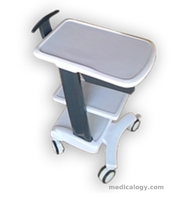- info@medicalogy.com
- 0877 7555 4616

Nurse Cap Trasti Warna Hijau
Dijamin original dan bergaransi
Odorless
Fiberglass free
Single use only
Bahan: Non Woven
Harga Nurse Cap Trasti Warna Hijau :
Produk yang dibeli bersamaan:
Deskripsi Nurse Cap Trasti Warna Hijau
Comfort
• Odorless
• Fiberglass free
• Single use only
• Bahan: Non Woven
Cap/penutup kepala bahan Non Woven, untuk melindungi bagian kepala saat melakukan tindakan, agar rambut terlindung, serta tidak meneteskan keringat.
Roles and Functions of the Nurse
What exactly does a nurse do? Your answer probably depends on the experiences that you have had in the past. Most people think a nurse is someone who gives a shot at the doctor's office - or simply is a doctor's assistant. Furthermore, images of nurses in the media also paint a different picture of who a nurse really is.
However, a nurse has a number of roles that he or she performs, often at the same time, depending on a patient's needs. With all of the changes in healthcare over the last few decades, that role has expanded even more. Let's explore a few of these roles.
Caregiver
As a caregiver, a nurse provides hands-on care to patients in a variety of settings. This includes physical needs, which can range from total care (doing everything for someone) to helping a patient with illness prevention. The nurse maintains a patient's dignity while providing knowledgeable, skilled care.
In addition, nurses care holistically for a patient. Holistic care emphasizes that the whole person is greater than the sum of their parts. This means that nurses also address psychosocial, developmental, cultural, and spiritual needs. The role of caregiver includes all of the tasks and skills that we associate with nursing care, but also includes the other elements that make up the whole person.
Decision Maker
Another role of the nurse, as a decision maker, is to use critical thinking skills to make decisions, set goals, and promote outcomes for a patient. These critical thinking skills include assessing the patient, identifying the problem, planning and implementing interventions, and evaluating the outcomes. A nurse uses clinical judgment - his or her ability to discern what is best for the patient - to determine the best course of action for the patient.
Communicator
As a communicator, the nurse understands that effective communication techniques can help improve the healthcare environment. Barriers to effective communication can inhibit the healing process. The nurse has to communicate effectively with the patient and family members as well as other members of the healthcare team. In addition, the nurse is responsible for written communication, or patient charting, which is a key component to continuity of care.
Review Nurse Cap Trasti Warna Hijau
Belum ada ulasan.












